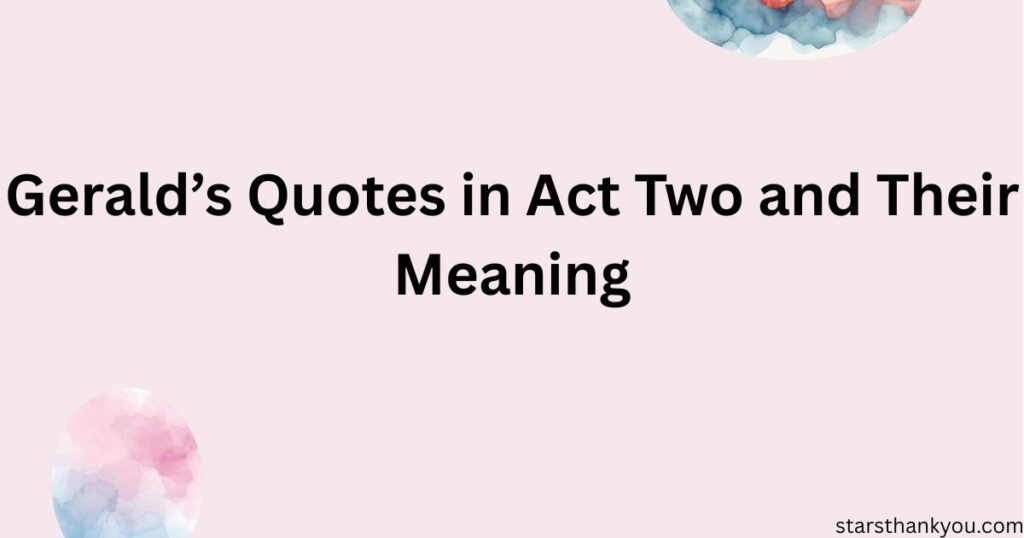Have you ever read An Inspector Calls and found yourself pausing at Gerald’s lines, wondering what they really reveal about him? Sometimes his words can be charming, confusing, or even frustrating, leaving you curious about the deeper meaning behind each moment he speaks. It’s easy to get lost in the drama and miss the subtleties of what Gerald is really saying.
In this post, we’ve gathered the most important Gerald quotes along with clear explanations and insights. You’ll get a deeper understanding of his character, his relationships, and the themes Priestley explores through him, making it easier to study, analyze, or just enjoy the story with more clarity.
Who Is Gerald Croft?
1. Gerald Croft is a young, well-bred man from a wealthy family, admired for his charm, confidence, and social grace, which make him a key figure in An Inspector Calls.
2. Gerald quotes often reveal his inner conflicts, showing a man who balances compassion with societal expectations, highlighting his evolving moral awareness.
3. He plays a central role in the story, bridging the old and young generations, reflecting the contrast between rigid classist ideals and emerging empathy in the younger characters.
4. Gerald demonstrates both human weakness and moral potential, as seen in his relationship with Eva Smith, where his actions mix kindness, guilt, and social propriety.
5. His charm and politeness often mask deeper conflicts, showing that outward appearances in upper-class society can be misleading and complex.
6. Gerald’s interactions with Sheila show his more progressive side, as he respects her opinions and feelings, unlike many older characters, highlighting his egalitarian tendencies.
7. Priestley uses Gerald to critique wealth and privilege, showing how comfort can distance individuals from the realities of working-class struggles, yet still allow room for conscience.
8. Gerald’s personal growth is gradual, as he initially defends actions that harm Eva but later recognizes the human consequences of social indifference and his own involvement.
9. His role emphasizes moral responsibility, showing that even those with privilege are accountable for their choices, reflecting Priestley’s social and ethical message.
10. Ultimately, Gerald Croft embodies the tension between societal expectation, personal integrity, and empathy, making him a complex, relatable, and thought-provoking character.
Most Memorable Gerald Quotes in Act One
1. Gerald Croft is first introduced as a confident, charming, and well-bred young man-about-town, quickly establishing his social standing and polished demeanor.
2. Gerald quotes such as “Well-bred, young-man-about-town” immediately highlight his upbringing and societal expectations, giving readers a glimpse into the upper-class world he inhabits.
3. When Gerald responds to Sheila, “Absolutely first class,” it shows his attempt to maintain a polite and refined image, reflecting the importance of appearances in Act One.
4. His slight defensiveness in “Except for all last summer, when you never came near me” reveals subtle tension and hints at hidden complexities in his personal relationships.
5. Gerald’s obedience and tact are shown in “I believe you’re right, sir,” where he aligns with Mr. Birling, reflecting both respect and the hierarchical nature of his world.
6. The quote “We’re respectable citizens and not criminals” demonstrates Gerald’s initial disbelief that his family could be morally questioned, showcasing the arrogance and self-perception of the upper class.
7. “Now listen, darling-” illustrates his attempts to calm Sheila and manage conflict, showing his polite, conciliatory approach and awareness of social decorum.
8. Gerald’s detachment from Eva Smith’s fate is highlighted in “I don’t come into this suicide business,” where he separates himself from responsibility, hinting at moral ambiguity.
9. When he says “So, for God’s sake, don’t say anything to the inspector,” Gerald tries to control the situation and conceal truths, foreshadowing his complex moral decisions later in the play.
10. The phrase “Women of the town-” is a delicate attempt to discuss sensitive topics politely, reflecting his awareness of social norms and the double standards regarding gender and class in 1912 society.
Gerald’s Quotes in Act Two and Their Meaning

1. In Act Two, Gerald’s compassion begins to show through when he says, “I didn’t install her there so that I could make love to her,” highlighting that his intentions were partly protective rather than purely selfish.
2. Gerald quotes like “I was sorry for her” reveal his empathy for Eva Smith, showing that despite his upper-class upbringing, he is capable of genuine concern for others, which adds depth to his character.
gates guilt and responsibility with “She didn’t blame me at all,” indicating his awareness of his influence on Eva’s life while trying to lessen his moral accountability.
4. His cautious reasoning appears in “We’ve no proof it was the same photograph and therefore no proof it was the same girl,” showing his desire to distance himself from the inspector’s inquiry while subtly acknowledging his connection to Eva.
5. Gerald reflects on social norms with phrases like “Women of the town,” attempting to address delicate topics politely while revealing upper-class biases and moral contradictions.
6. In Act Two, he says, “I want you to understand that I didn’t install her there so that I could make love to her,” emphasizing that his actions were motivated by pity and concern rather than lust, revealing the complexity of his character.
7. Gerald’s protective nature comes through in, “All she wanted was to talk, a little friendliness,” showing that he recognized Eva’s vulnerability and offered comfort in a moment of distress, highlighting a moral awareness.
8. When he mentions, “She agreed at once,” it indicates Eva’s trust in him, which illustrates the delicate power dynamic between the upper-class Gerald and working-class Eva while highlighting his sense of responsibility.
9. Gerald admits, “I insisted on a parting gift of enough money,” showing his attempt to provide financial help without exploiting her, reflecting both generosity and a subtle acknowledgment of societal inequalities.
10. His quote, “Yes, I suppose it was inevitable. She was young and pretty and warm-hearted,” reveals his awareness of human attraction and dependency, highlighting the tension between affection, power, and moral choice in his relationship with Eva.
Read More : Saturday Quotes
Gerald’s Quotes in Act Three and Their Significance
1. Gerald’s reaction to Sheila returning the ring, “I see. Well, I was expecting this,” reflects his realistic and human response to consequences, showing that he is more progressive than the rigid patriarchal norms of the time.
2. Gerald quotes in Act Three, like “Of course!” When agreeing with Birling about the inspector’s relevance, show the complexity of his character, as he balances self-interest with moral reflection, highlighting the tension between empathy and social conformity.
3. His acknowledgment, “Yes, we’d agreed about that,” about supporting Eva financially, underscores the irony that his aid was necessary only because of the injustices caused by the Birlings, connecting personal action to societal critique.
4. Gerald admits, “We’ve no proof it was the same girl,” revealing his cautious mindset, as he tries to reconcile the uncertainty of the inspector’s authority with the undeniable moral lessons of the evening.
5. In lines like “I was expecting this,” Gerald’s acceptance of Sheila’s decision highlights the theme of personal accountability, showing that he can face the consequences of his actions while the broader class-based critique of the play continues to unfold.
6. Gerald’s calm response to the revelations, “I see. Well, I was expecting this,” shows his ability to reflect on events logically, marking him as a character who can evolve and adapt to complex moral situations.
7. His quotes in Act Three, Gerald quotes like “Of course!” emphasize the contrast between superficial social respectability and genuine ethical responsibility, contributing to the play’s exploration of human morality.
8. Gerald’s statements reveal the tension between social class and personal ethics, showing that although he benefits from wealth and status, he is capable of recognizing moral failings and taking appropriate action.
9. Lines such as “Yes, we’d agreed about that” reinforce the interconnectedness of personal choices and broader societal consequences, a central theme in An Inspector Calls.
10. Gerald’s final words in Act Three highlight the complexity of human relationships, demonstrating that love, responsibility, and morality are intertwined, and that personal growth often comes from confronting uncomfortable truths.
Gerald Quotes That Reveal His Relationships
1. Gerald’s words to Sheila, “Now listen, darling,” show his attempt to calm her down and maintain harmony, reflecting the dynamics of their romantic relationship and his desire to be seen as caring and considerate.
2. Gerald quotes like “I was sorry for her” reveal his compassion toward Eva Smith, highlighting the complex mix of empathy, social responsibility, and personal involvement that defines his interactions with those from different social classes.
3. His statement, “So for God’s sake don’t say anything to the inspector,” illustrates how Gerald navigates the tension within the Birling family, balancing loyalty, secrecy, and the protection of personal and familial reputations.
4. Gerald’s reaction to Mrs. Birling’s remarks, such as his irritation when she boasts about her status, indicates his subtle distancing from rigid classism, suggesting that he values character and action more than social position or hierarchy.
5. Lines like “She didn’t blame me at all” demonstrate how Gerald manages accountability and relationships, showing that he seeks to protect himself emotionally while also understanding the effects of his actions on Sheila and Eva, emphasizing the intricate moral web in the play.
6. Gerald’s calm engagement with the inspector, paired with statements like Gerald quotes “I don’t come into this suicide business,” reflects the tension between personal responsibility and social morality, shaping how he interacts with each character.
7. His gentle persuasion with Sheila shows that he is sensitive to her feelings and viewpoints, indicating that their relationship is rooted in dialogue and emotional negotiation rather than pure dominance or patriarchal expectation.
8. Gerald’s actions and words toward Eva, from helping her escape Joe Meggarty’s harassment to providing financial support, reveal a mixture of chivalry, guilt, and personal desire, offering insight into the moral complexity of his character.
9. In moments with Mr. and Mrs. Birling, Gerald aligns himself when convenient but also subtly challenges the more rigid views of his elders, suggesting that his relationships within the family are guided by both respect and personal judgment.
10. Overall, Gerald’s quotes demonstrate how he navigates love, duty, and morality, showing that his relationships with Sheila, Eva, and the Birling family are layered, influenced by social class, personal ethics, and genuine human feeling.
Gerald Quotes About Class, Status, and Society

1. Gerald’s remark, “Absolutely first class,” shows his awareness of social appearances and how he navigates upper-class expectations, reflecting the pressures of maintaining status and refinement in society.
2. Gerald quotes like “We’re respectable citizens and not criminals” highlight his initial belief in the moral superiority of the upper class, revealing how social hierarchy shapes his worldview and decisions within the play.
3. When he comments on the Birlings’ behavior or Mr. Birling’s work, Gerald subtly contrasts his own attitudes with theirs, indicating that generational differences influence how the younger upper class perceives reputation, privilege, and social responsibility.
4. His dialogue about Eva Smith, while showing sympathy, also exposes the limits of his understanding due to class distance, emphasizing how societal divisions prevent the upper class from fully grasping the struggles of the working class.
5. Gerald’s interactions, particularly when he navigates between Sheila, the inspector, and his family, reflect the tension between personal morality and social expectation, demonstrating how class and status inform his choices, behaviors, and moral awareness throughout the play.
6. Lines like “I don’t come into this suicide business” reveal how Gerald initially separates himself from the consequences of social inequality, showing a typical upper-class perspective shaped by privilege and lack of direct engagement with the working class.
7. Gerald’s polite, careful speech when referring to “Women of the town” illustrates the influence of social norms and class perception, as he balances propriety with his own actions, highlighting generational and societal expectations.
8. By acknowledging his financial and social advantages while helping Eva Smith, Gerald demonstrates the complexity of class consciousness, blending genuine empathy with the constraints and privileges of his upper-class upbringing.
9. His subtle critiques of Mrs. Birling’s rigidity and Mr. Birling’s self-importance show a nuanced awareness of class hierarchy, suggesting that the younger generation may challenge the entrenched values of the older elite.
10. Overall, Gerald’s quotes about class, status, and society reveal a character navigating the intersections of privilege, morality, and generational change, showing how social hierarchy influences both behavior and ethical reflection.
Also Read This : Secret Love Quotes to Express Hidden Feelings
Lessons and Themes from Gerald’s Quotes
1. Gerald’s words often reveal his inner conflict between personal desire and social expectation, showing how individuals navigate morality and human nature within rigid class structures.
2. Gerald quotes like “I was sorry for her” highlight the theme of responsibility, as they show how empathy and moral awareness can emerge even amidst social privilege and personal flaws.
3. Through his dialogue, Gerald exposes the tension between appearance and reality, illustrating Priestley’s broader message about honesty, conscience, and the consequences of ignoring human suffering.
4. His reflections on Eva Smith’s plight connect to universal themes of justice and compassion, emphasizing that personal actions, even small ones, can profoundly impact the lives of others.
5. Gerald’s interactions with Sheila, the Birlings, and the inspector serve as lessons in human behavior, reminding readers that morality is complex and influenced by social context, privilege, and individual choice.
6. Quotes where Gerald initially distances himself from Eva’s suicide show the struggle between denial and responsibility, reflecting the broader theme of accountability within both personal and societal frameworks.
7. His evolving attitude toward Eva Smith demonstrates that moral growth often comes from direct engagement with the consequences of one’s actions, reinforcing the importance of empathy and self-reflection.
8. Gerald’s combination of compassion and social awareness underscores Priestley’s exploration of human nature, illustrating how class, privilege, and personal morality intersect in shaping ethical decisions.
9. By examining Gerald’s behavior, readers can extract lessons about the dangers of complacency and the need for social responsibility, making his quotes a lens for understanding wider societal themes.
10. Ultimately, Gerald’s quotes provide a roadmap for interpreting the play’s moral and social lessons, highlighting how responsibility, empathy, and human nature are intertwined in the challenges of both individual and collective conscience.
FAQs
What are 5 key quotes from Gerald?
- “I was sorry for her” shows compassion for Eva Smith.
- “I don’t come into this suicide business” reflects denial of responsibility.
- “Well-bred, young-man-about-town” describes his social image.
- “Now listen, darling” shows his attempt to calm Sheila.
- “I didn’t install her there so that I could make love to her” emphasizes moral complexity.
What quotes show Gerald is evasive?
- “Well, there’s nothing to settle as far as I’m concerned” avoids admitting involvement.
- “I’ve never known Eva Smith” lies about familiarity.
- “All right. I knew her. Let’s leave it at that” reluctantly admits the truth.
What was Gerald Wilson’s famous quote?
- “I was sorry for her” highlights his empathy toward Eva Smith.
What are Gerald of Wales quotes?
- “I believe you’re right, sir” shows agreement with authority figures.
- “We’re respectable citizens and not criminals” reflects social status and morality.
- “Absolutely first class” portrays his attempt to maintain an upper-class image.
write answer in 3 points What is Geralt’s philosophy?
- Pragmatic Realism :Facing the world as it is and making practical choices.
- Moral Neutrality : Avoiding taking sides and letting people face consequences.
- Respect for Life and Honor :Valuing life, loyalty, and acting ethically.
Conclusion
Gerald Croft’s character in An Inspector Calls is complex, showing both charm and moral ambiguity. Through his actions and dialogue, we see a man torn between social expectations, personal desires, and genuine compassion. His quotes reveal his relationships, attitudes toward class, and evolving sense of responsibility, making him a pivotal figure in understanding the play’s themes.
By exploring these Gerald quotes, readers gain insight into how Gerald navigates society, love, and morality. His words reflect generational differences and human weaknesses, leaving a lasting impression on both the story and its audience.

Zarnab Naeem is a professional article writer and SEO expert, specializing in crafting content that ranks and resonates. With extensive experience in digital publishing, Zarnab combines creativity with strategy to deliver results. Passionate about quality, every piece is tailored for impact and engagement.

